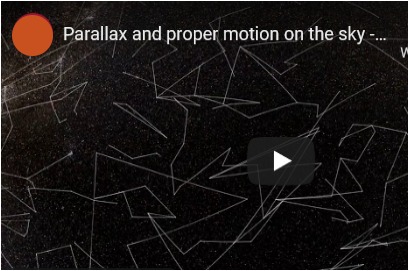“These
men
are
those
who
are
hidden
reefs
in
your
love
feasts
when
they
feast
with
you
without
fear,
caring
for
themselves;
clouds
without
water,
carried
along
by
winds;
autumn
trees
without
fruit,
doubly
dead,
uprooted;
wild
waves
of
the
sea,
casting
up
their
own
shame
like
foam;
wandering stars, for whom the black darkness has been reserved forever” (Jude 12,13).
Perspective
“Wandering
stars”
is
actually
a
contradiction
in
terms.
From
the
perspective
of
humans
on
Earth,
stars
do
not
move,
much
less
wander.
This
is
one
difference
between
them
and
planets.
Stars
are
stationary;
planets
move.
In
fact,
the
word,
“planet,”
comes
from
the
Greek
word,
planetēs
,
which
means,
“wanderer.”
Unlike
planets,
stars
remain
fixed
in
their
places,
and
so
much
so
that
mariners
set
their
courses
by
their
reliable
locations in the sky.
Why,
then,
does
Jude
describe
these
men
as
“wandering
stars”?
Perhaps
their
brilliance
leads
others
to
believe
that
they
are
“stars,”
but
if
they
keep
their
eyes
on
them
long
enough,
they
will
notice
that
they
have
changed
positions.
They
might
initially
seem
attractive
and
reliable,
but
when
they
become
better
known,
one
discovers
that
they
are
no
longer
spiritually
where
they
once
were.
They
“have
wandered
away from the faith” (1 Tim. 6:10). They are just “planets.”
However,
an
even
deeper
truth
is
that
stars
themselves
have
their
own
independent
movement,
even
apart
from
that
which
they
seem
to
have
from
the
rotation
and
revolution
of
Earth.
It
just
appears
that
they
are
stationary,
because
they
are
so
much
farther
away
than
planets.
The
only
planets
which
can
be
seen
by
the
naked
eye
lie
within
this
solar
system
and
relatively
close
to
the
Earth.
Stars,
on
the
other
hand,
are
so
far
away
that
their
distance
from
Earth
is
measured
in
light-
years,
while
the
distance
of
planets
from
Earth
is
measured
in
miles.
Nevertheless,
stars
are
so
far
away
that
humans
cannot
detect
their
movement.
They
seem
fixed
in
place.
This
is
called
the
parallax
effect
.
In
this
phenomenon,
the
closer
objects
are
to
the
viewer,
the
faster
they
seem
to
move,
and
vice
versa.
To
a
driver,
mountains
in
the
distance
will
hardly
seem
to
move,
while
the
trees
on
the
side
of
the
road
appear
to
zoom
past.
This
illustrates
and
emphasizes
the
importance
of
perspective.
The
closer
people
get
to
something,
the
more
they
perceive
it
as
it
really
is.
This
principle
is
recognized
in
proverbs
like
“walk
a
mile
in
another’s
shoes”
or
“familiarity
breeds contempt.”
To
put
it
simply,
distance
changes
perspective
.
For
instance,
many
do
not
understand
or
like
the
Bible.
To
them,
it
appears
that
the
Bible
has
many
flaws
and
nothing
to
commend
itself
to
them
as
worthy
of
their
consideration,
but
this
might
only
be
because
they
have
kept
their
distance
from
it.
They
have
never
gotten
close
enough
to
give
it
a
careful
and
fair
evaluation.
Perhaps
they
listen
too
readily
to
others’
criticisms
of
it
without
looking
at
it
for
themselves.
Yet,
if
they
would
just
give
themselves
an
opportunity
to
get
to
know
the
Bible
“up
close
and
personal,”
they
might
come
away
with
a
much more favorable impression of it.
It
is
also
true
that
people
can
more
accurately
assess
those
they
get
to
know.
People
often
become
more
understanding
and
sympathetic
toward
others
and
lose
their
prejudices,
if
they
are
put
in
situations
where
they
have
to
work
with
them
and
rely
on
them.
Under
such
circumstances,
even
enemies
might
discover
how
much
they
have
in
common,
or
that
the
others
are
not
what
they
thought,
and
befriend
one
another.
However,
if
they
put
space
between
each
other
and
maintain
their
distance,
this
allows
them
to
harbor
misimpressions about each other.
One
can
never
have
a
proper
perspective
on
God
as
long
as
he
keeps
Him
at
a
distance.
As
Paul
put
it
to
the
Athenians,
God
made
humans
so
“that
they
should
seek
God,
if
perhaps
they
might
grope
for
Him
and
find
Him,
though
He
is
not
far
from
each
one
of
us”
(Acts
17:27).
Indeed,
He
is
as
close
as
the
Bible and as near as prayer.


MARS










Copyright © 2017 - current year, Gary P. and Leslie G. Eubanks. All Rights Reserved.
Perspective
“Wandering
stars”
is
actually
a
contradiction
in
terms.
From
the
perspective
of
humans
on
Earth,
stars
do
not
move,
much
less
wander.
This
is
one
difference
between
them
and
planets.
Stars
are
stationary;
planets
move.
In
fact,
the
word,
“planet,”
comes
from
the
Greek
word,
planetēs
,
which
means,
“wanderer.”
Unlike
planets,
stars
remain
fixed
in
their
places,
and
so
much
so
that
mariners
set
their
courses
by their reliable locations in the sky.
Why,
then,
does
Jude
describe
these
men
as
“wandering
stars”?
Perhaps
their
brilliance
leads
others
to
believe
that
they
are
“stars,”
but
if
they
keep
their
eyes
on
them
long
enough,
they
will
notice
that
they
have
changed
positions.
They
might
initially
seem
attractive
and
reliable,
but
when
they
become
better
known,
one
discovers
that
they
are
no
longer
spiritually
where
they
once
were.
They
“have
wandered
away
from
the
faith”
(1
Tim.
6:10).
They
are
just “planets.”
However,
an
even
deeper
truth
is
that
stars
themselves
have
their
own
independent
movement,
even
apart
from
that
which
they
seem
to
have
from
the
rotation
and
revolution
of
Earth.
It
just
appears
that
they
are
stationary,
because
they
are
so
much
farther
away
than
planets.
The
only
planets
which
can
be
seen
by
the
naked
eye
lie
within
this
solar
system
and
relatively
close
to
the
Earth.
Stars,
on
the
other
hand,
are
so
far
away
that
their
distance
from
Earth
is
measured
in
light-years,
while
the
distance
of
planets
from
Earth
is
measured
in
miles.
Nevertheless,
stars
are
so
far
away
that
humans
cannot
detect
their
movement.
They
seem
fixed in place. This is called the
parallax
effect
.
In
this
phenomenon,
the
closer
objects
are
to
the
viewer,
the
faster
they
seem
to
move,
and
vice
versa.
To
a
driver,
mountains
in
the
distance
will
hardly
seem
to
move,
while
the
trees
on
the side of the road appear to zoom past.
This
illustrates
and
emphasizes
the
importance
of
perspective.
The
closer
people
get
to
something,
the
more
they
perceive
it
as
it
really
is.
This
principle
is
recognized
in
proverbs
like
“walk
a
mile
in
another’s
shoes”
or
“familiarity breeds contempt.”
To
put
it
simply,
distance
changes
perspective
.
For
instance,
many
do
not
understand
or
like
the
Bible.
To
them,
it
appears
that
the
Bible
has
many
flaws
and
nothing
to
commend
itself
to
them
as
worthy
of
their
consideration,
but
this
might
only
be
because
they
have
kept
their
distance
from
it.
They
have
never
gotten
close
enough
to
give
it
a
careful
and
fair
evaluation.
Perhaps
they
listen
too
readily
to
others’
criticisms
of
it
without
looking
at
it
for
themselves.
Yet,
if
they
would
just
give
themselves
an
opportunity
to
get
to
know
the
Bible
“up
close
and
personal,”
they
might
come
away
with
a
much
more favorable impression of it.
It
is
also
true
that
people
can
more
accurately
assess
those
they
get
to
know.
People
often
become
more
understanding
and
sympathetic
toward
others
and
lose
their
prejudices,
if
they
are
put
in
situations
where
they
have
to
work
with
them
and
rely
on
them.
Under
such
circumstances,
even
enemies
might
discover
how
much
they
have
in
common,
or
that
the
others
are
not
what
they
thought,
and
befriend
one
another.
However,
if
they
put
space
between
each
other
and
maintain
their
distance,
this
allows
them
to
harbor
misimpressions
about each other.
One
can
never
have
a
proper
perspective
on
God
as
long
as
he
keeps
Him
at
a
distance.
As
Paul
put
it
to
the
Athenians,
God
made
humans
so
“that
they
should
seek
God,
if
perhaps
they
might
grope
for
Him
and
find
Him,
though
He
is
not
far
from
each
one
of
us”
(Acts
17:27).
Indeed,
He
is
as
close
as
the Bible and as near as prayer.


MARS



“These
men
are
those
who
are
hidden
reefs
in
your
love
feasts
when
they
feast
with
you
without
fear,
caring
for
themselves;
clouds
without
water,
carried
along
by
winds;
autumn
trees
without
fruit,
doubly
dead,
uprooted;
wild
waves
of
the
sea,
casting
up
their
own
shame
like
foam;
wandering
stars,
for
whom
the
black
darkness
has
been
reserved
forever”
(Jude 12,13).








